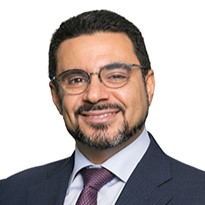-
Statutory Audit
We conduct an integrated audit, which combines the financial statement audit,independent and objective assurance on financial information, transactionsand processes.
-
Limited Review
We offer services relating to reviews of historical financial informationby expressing negative assurance on such historical financial information.
-
Agreed Upon Procedures
We engage with organisationsto perform specific procedures and report findings to conform to their needs.
-
Financial Reporting Advisory Services (FRAS)
Our team provides timely advice on the impact of accounting changes to assist businesses in the development of an appropriate implementation roadmap.
-
Business Consulting
Grant Thornton UAE provides organisations with implementable plans that drive sustainable growth strategies to grow and optimise their business performance.
-
Business Risk Services
Organisations need to understand risks thoroughly to be able to manage them better. Grant Thornton UAE helps businesses achieve the best balance between minimising risk exposure, optimising profitability and developing compliance review checklists.
-
Regulatory Advisory Services
Grant Thornton UAE's extensive understanding of the overarching supervisory framework within the region equips our professionals to support financial institutions comply and abide by the set of regulatory mandates throughout the rapidly evolving ecosystem.
-
Financial Advisory
Grant Thornton UAE works with organisations on transactions from start to finish, assisting with strategy, identifying risks, executing deals, and helping to unlock their potential for growth and value creation.
-
Restructuring Advisory
Grant Thornton UAE is committed to realising value for shareholders, in a way that recognises and supports the interests of all stakeholders. Our solutions maximise value, provide clarity and direction, and accelerate recovery and transformation for businesses.
-
Technology Advisory & Cybersecurity
IT and technology are fundamental to drive the performance of businesses. Through leveraging the power of technology, Grant Thornton UAE helps organisations define and identify growth opportunities to achieve value-driven transformation and innovation.
-
Forensics
Fraud and corruption pose a growing challenge worldwide. As the commercial landscape changes, an increasingly regulated environment requires stringent governance and compliance processes. Grant Thornton UAE helps organisations navigate challenges and crisis with a hands-on approach coupled with the use of technology.
-
ESG Services
The Environment, Social and Governance (ESG) agenda has gained significant traction over the years, to become one of the key strategic aspects of any business. It is imperative that all organisations, irrespective of industry sector, engage with their stakeholders and prioritise ESG practices to unlock sustainable growth opportunities.
-
Business Process Solutions
Our team at Grant Thornton offers comprehensive and cost effective outsourced solutions, enabling stakeholders and business owners to focus on their core business goals.
-
Corporate Tax
Our diversified team of corporate tax subject matter experts combines a perfect blend of international experience across several industry sectors, technical expertise, and commercial nuances with a commitment to deliver exceptional value to your business.
-
VAT
The VAT team at Grant Thornton is well versed with the VAT Laws applicable across the region and holds valuable experience and professional accreditation in assisting clients across diverse industries to comply with the VAT obligations.
-
Transfer Pricing
Grant Thornton UAE assists its clients in providing transfer pricing solutions that are implementable and operational, considering the facts and concerns of its clients.
-
International Tax and Tax Due Diligence
Grant Thornton UAE supports multinational groups to optimise their tax structures. We can also assist businesses in analysing existing group transactions and inter-group supplies, as well as advising on potential implications of various taxes to facilitate an efficient Group tax structure.
-
Economic Substance Requirements
Economic Substance rules were introduced in the UAE in 2019, requiring UAE businesses that undertake certain ‘Relevant Activities’ to maintain and demonstrate adequate substance.
-
Customs and International Trade
The team at Grant Thornton is positioned centrally to assist the businesses with global cross-border tax structuring, planning and compliance needs.
-
Excise Tax
We provide Excise Tax related advisory and compliance services to the producer, importer, and the storekeeper of excisable goods
The UAE has continued to drive change in the region and has remained extremely buoyant during the course of 2014. It has one of the most stable economies in the world and has witnessed remarkable growth which continues to position it high in terms of global competitiveness, according to reports by specialized regional and international organizations (emirates247, 2014).
I have already shared how the UAE is making its mark on the global map, but what does 2015 have in store for the economy? What are the current predications and could this be one of the most momentous years to date in terms of the economic landscape which continues to change the market?
When looking at the real estate and construction sector, it is evident that after facing a slowdown in the course of the global financial crisis in 2008 and with the current retrieval in GCC economies, the UAE construction industry is anticipated to show growth prospects. Construction as a percentage of GDP of the UAE reached 10.6 per cent in 2008 and 10.3 per cent in 2011 while for 2015 the sector’s contribution as a percentage of UAE GDP is projected to record 11.1 per cent (emirates247, 2012).
It is predicated, that the growth of Dubai's residential real estate market is expected to peak in 2015, however it will not go through the same intense pitfall that was seen in 2008 and 2009. The UAE’s increasing population will guarantee strong demand for properties in the anticipatable future, further promoting grow within the real estate & construction sector.
In other news, it has also been reported that almost half of the UAE’s 49.1 billion dirhams federal budget for 2015 will be spent on social sectors like health, education and social services further promoting growth within the public sector. The Council of Ministers approved the 2015 budget, which saw an increase of 2.9 billion dirhams, or 6.3 percent, from the financial year 2014 (as stated on Arabian Business).
Furthermore, the International Monetary Fund (IMF) predicted in its Financial Stability report 2014, that the UAE would uphold a surplus in its government budget from 2014 to 2019, at rates ranging from 6.9 percent to 10.5 percent of the GDP.
When we look at developments within leisure and hospitality, the current unveiling of a large number of exciting new developments signifies that Dubai is on the right track to attain tourism targets of 15 million tourists per year by 2015.
As part of its vision and mission and in agreement with Dubai’s 2015 strategy, the Dubai Department of Tourism and Commerce Marketing (DTCM) has established a training solutions centre for excellence to develop world-class human resources at all levels of the travel and tourism industry in the emirates (dubaitourism, 2014). The DTCM will also be providing the hospitality industry with a monitoring system that will help the sector in gauging the emission of CO2 and will help them in making decisions to cut down emissions and compare their performance to international best practice, further promoting sustainability.
With the Expo 2020 set to come to the UAE in five years from 2015, the leisure and hospitality sector will continue to see a number of key developments and investment, with some of the largest international hotelier brands now being based in the UAE. This will continue to support economic diversification, along with further supporting the UAE to become the central hub of the Middle East which is known internationally for innovation, excellence and the investors market of choice.
Taking the above into consideration, 2015 looks set to become another memorable year for the country with increased investment and external interest. As we approach the New Year, I believe that optimism within the region has continued to remain high despite the recent fluctuations within the oil prices. This further supports the fact that the UAE continues to successfully diversify within various other industries apart from the once buoyant oil & gas sector, which is essential to promote sustainability, longevity and safeguard the people, economy and future of the country.

